South Bend Democratic mayoral candidates offer starkly different visions of city's health
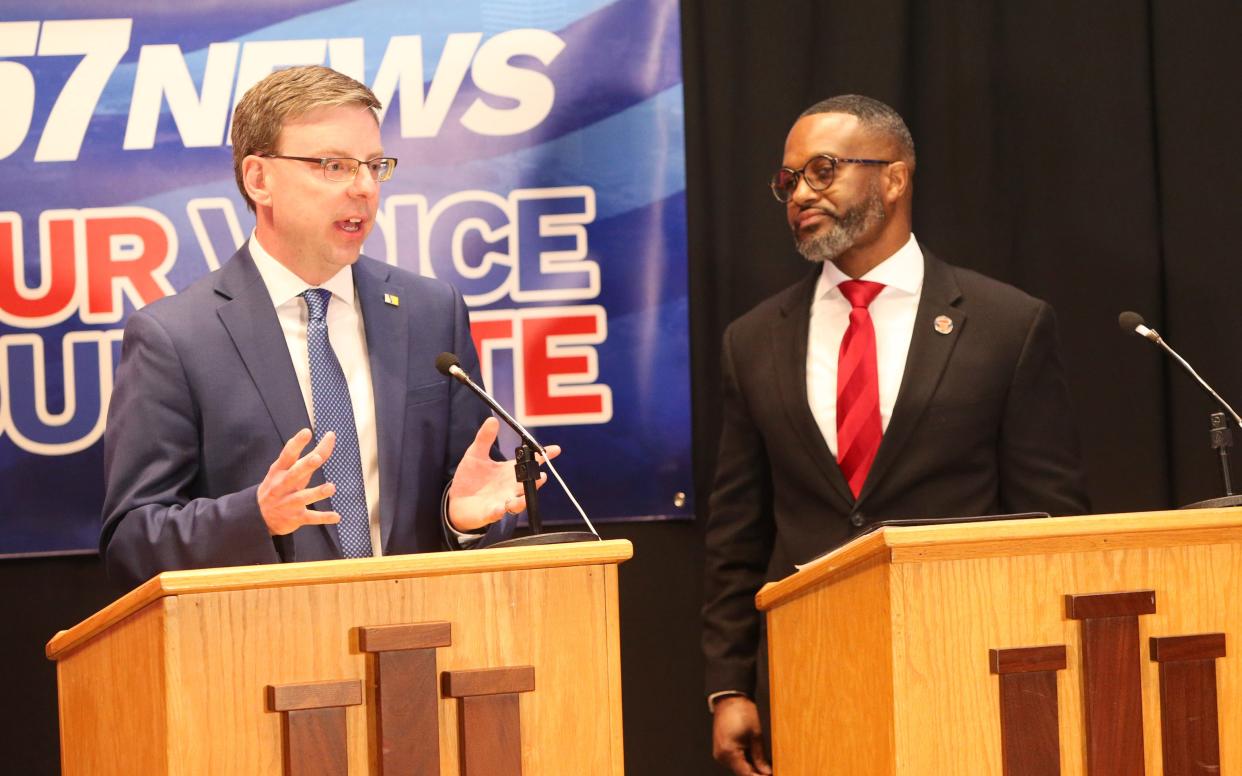
- Oops!Something went wrong.Please try again later.
SOUTH BEND ― The two Democrats running for mayor of South Bend strike starkly disparate tones when discussing the city's trajectory.
“South Bend has turned a corner,” South Bend Mayor James Mueller said during a televised debate Wednesday night. “We have seen and attracted record investment in our city. We have had the fastest population growth since the 1960s. We’ve invested in our neighborhoods all across the city, including those forgotten in the past.”
The mayor’s challenger, 2nd District Common Council member Henry Davis Jr., countered that statement bluntly: “This administration says we’re doing well, and every day we turn on the TV, we’re living a nightmare in South Bend.”
In review:Pete Buttigieg took big swings and declared 'South Bend is back.' Is it really back?
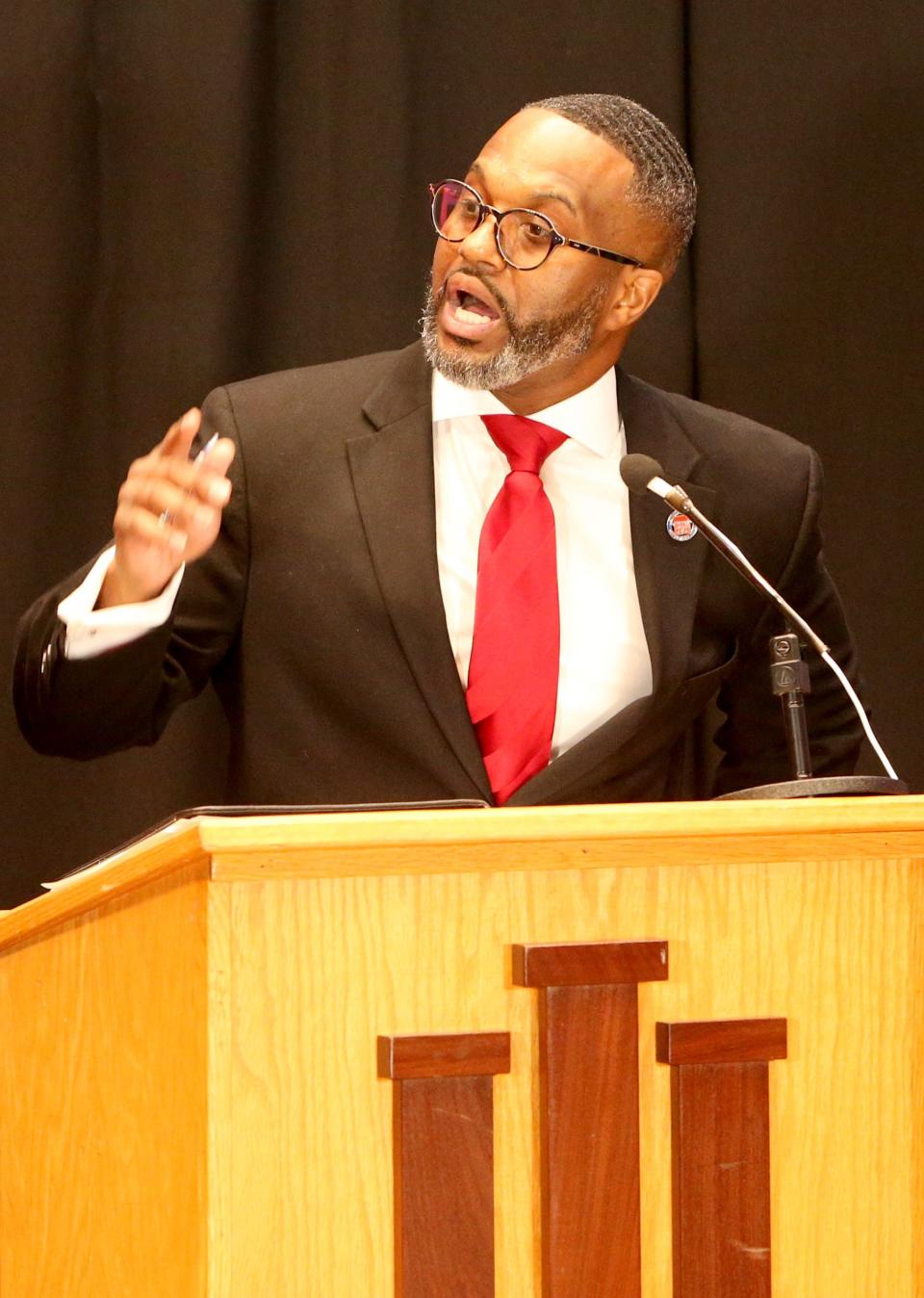
Davis, who lost in the 2015 mayoral primary against Pete Buttigieg, wants voters to reject the idea that Mueller is successfully continuing his predecessor’s progress. He points to negative headlines about a recent rash of killings and South Bend schools’ controversial facility planning for his proof.
“Our school corporation is folding right before our eyes,” he said. “Our children are living in very hostile environments. And we do nothing. We shell our money out to the wealthy. We give them tax abatements, tax credits, for projects that quite frankly are taking up our downtown area.”
The debate was the first in a series among candidates for city office to be held before the May 2 primary election. Voters can register until April 3. Early voting begins April 4.
Here are a few of the main issues the two debated Wednesday night in Indiana University South Bend's Arts and Education Building.
How to combat crime
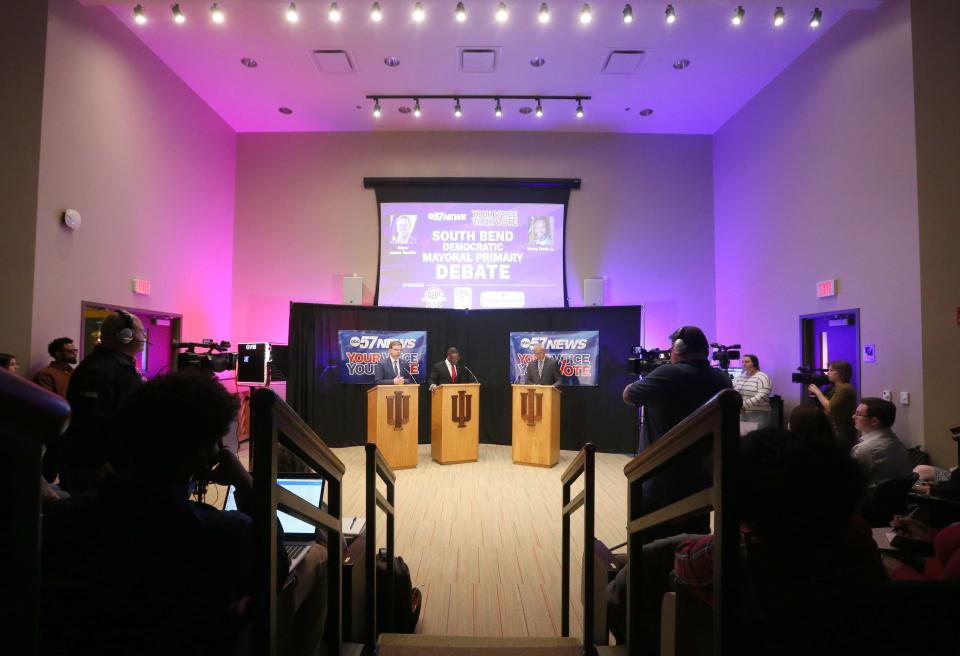
In line with politicians nationwide, both candidates said violent crime, particularly gun violence, is a core issue.
“We're struggling to win a battle for our kids' hearts and souls,” Mueller said. “We know gun violence is taking over our community just like it's taken over other cities in our country.”
Mueller sees progress, citing an 11% drop in the most severe crimes from 2019 to 2022.
Mueller touted 16 new SBPD officers hired Wednesday to show his support for investing more resources in policing. SBPD now exceeds its budgeted staffing level of 240 officers.
'Real time crime center':South Bend police unveil video surveillance control room
More:South Bend police plan 'real-time crime center.' Success rests on buy-in for surveillance
The candidates disagreed over the benefit of a "real-time crime center" recently debuted by SBPD. Mueller agrees with police leaders that a robust network of surveillance cameras will help officers to curb violence and to solve criminal investigations at higher rates and more quickly.
But Davis worries about how the surveillance and corresponding facial recognition technology could be used to the detriment of Black residents, as studies have shown.
"A facial recognition system that unfairly targets African Americans and people of color is outrageous," Davis said. "Those people need investment. They need better neighborhoods. They certainly need better housing."
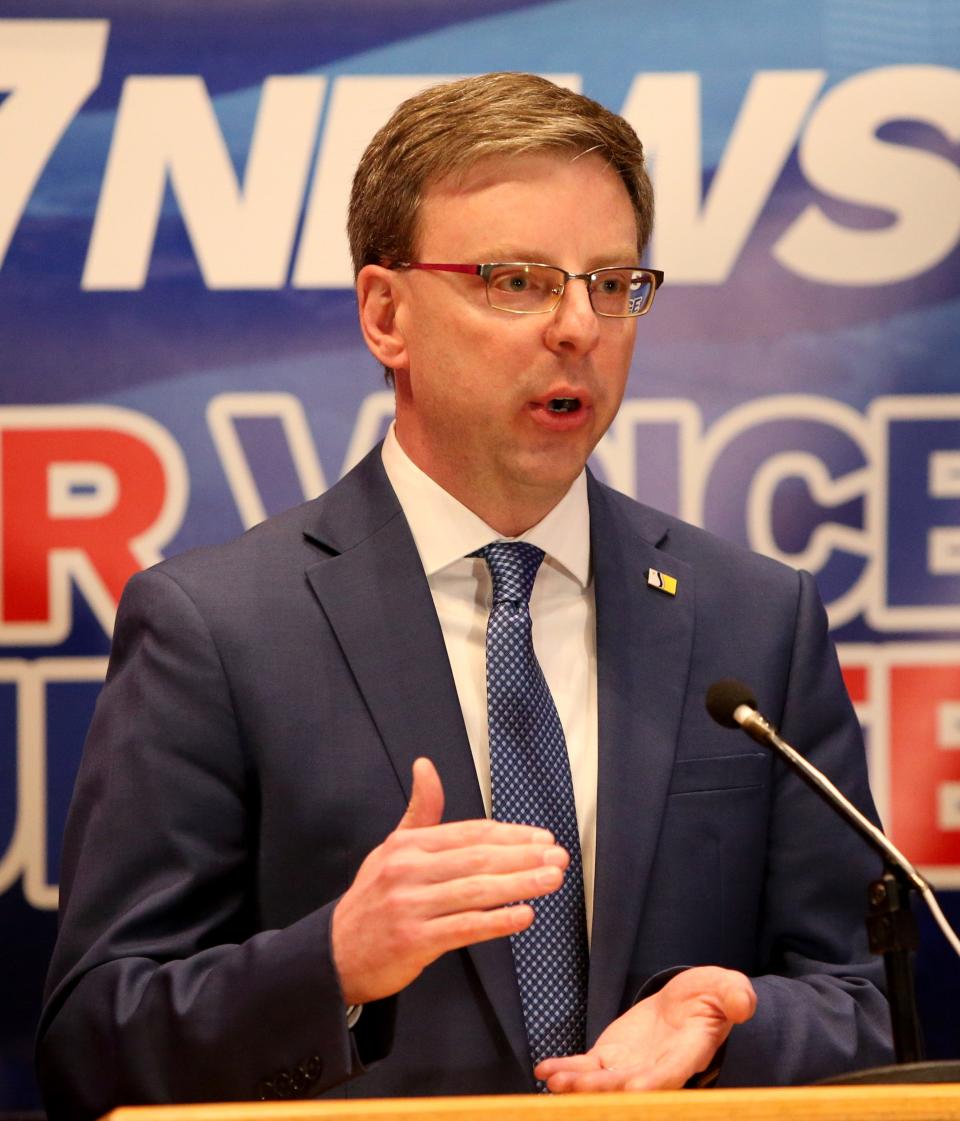
Davis focused on South Bend’s recurring status atop the list of high-crime Indiana cities. He said disinvestment from struggling neighborhoods on the west and near southeast sides has led to highly concentrated crime.
“When it comes to crime, we have to invest in people,” Davis said. “We have to invest in neighborhoods. We have to rebuild our neighborhoods.”
Davis supported opening a South Bend Police Department substation in downtown South Bend, similar to the one in Eddy Street Commons. Police should be concentrated in higher-crime areas, he said, but he doesn’t believe continually hiring more officers is the solution.
More:South Bend to fund mental health crisis center after county tables proposal
The mayor pointed to higher levels of government for their failure to address widespread access to guns. He criticized the Indiana General Legislature’s decision last year to allow permitless carry, a move decried by local law enforcement.
“When there are guns all around us, it’s turning into a Wild West where a simple argument can turn into a fatality,” Mueller said. “We need to have common-sense gun-control measures in our city, but that’s not within the jurisdiction of our mayor.”
“A lot of these senseless acts of violence are occurring really for just the most ridiculous of reasons,” Mueller added. “And so we’ve got to reach the hearts and minds of our people and win them over. ... They don’t have to choose a path of violence.”
How to attract investment to the city
Mueller said his administration strives to spur investment not just downtown but in surrounding neighborhoods, now that South Bend has shaken the perception it’s a dying city.
Our Opinion: South Bend as a 'dying' and 'most violent' city? Let's set the record straight.
A key industry he aims to attract now is housing, he said. Mueller said in the last three years, developers have built or made plans to build about 1,500 housing units across South Bend. A quarter of those are tailored to lower-income renters, Mueller said.
“We need a spectrum of housing from both affordable to market-rate to bring in the workforce,” he said. “Because we know businesses today are looking for workers. It’s not workers or people following smokestacks anymore. Economic development is about the employers following the people.”
Housing:Two South Bend projects for 114 affordable units are chosen in competitive state program
But Davis says the administration remains too focused on investment by wealthy developers downtown or near the University of Notre Dame.
The city’s advances have been concentrated in areas where people are well off, Davis argues, leaving out those living in poorer neighborhoods on the west and southeast sides.
More:Former Notre Dame hoops star to get tax credits for South Bend affordable housing project
Davis mentioned $250,000 of subsidies the city recently revoked from the Far Northwest Neighborhood Association, which represents an area with many non-white residents, after the group was delayed in building new housing.
At the same meeting, the Common Council approved a tax abatement plan for “rich, white developers” restoring an apartment building downtown, Davis said.
“South Bend needs investment in all corners, yes it does,” Davis said, “but the areas that we are seeing the most crime definitely need the investment.”
As for infrastructure investment, Mueller highlighted his multi-year Rebuilding Our Streets initiative. He said the city’s on track to pave more than 185 miles of road over the course of his term.
According to city engineers, Mueller said, the average rating of a South Bend street on a 10-point scale is around a six.
The city's role in aiding schools
Both candidates acknowledged how a city’s school system is crucial to the long-term success of its neighborhoods. But specific details are vague on the role of city government in aiding the separately run school corporation.
More:South Bend chucks idea of closing 2 high schools; 1 high school closure still on the table
Mueller highlighted the city’s partnership with schools and United Way to expand pre-K slots by 500 kids. He said the city should take an active role in assessing what after-school and summer programming is available for students.
Davis said that in 2009, he wrote a bill that formed a partnership between city and school leaders. But meetings and collaboration have been sparse, according to Davis.
“We need a seat at the table with the school board and also with the school superintendent,” Davis said.
“We’re going to have to create an identity for our city,” he added, “and we’re going to have to figure out what the industry that we’re going to go forward with is, given the fact that our school corporation’s on board with us.”
Candidates display different approaches
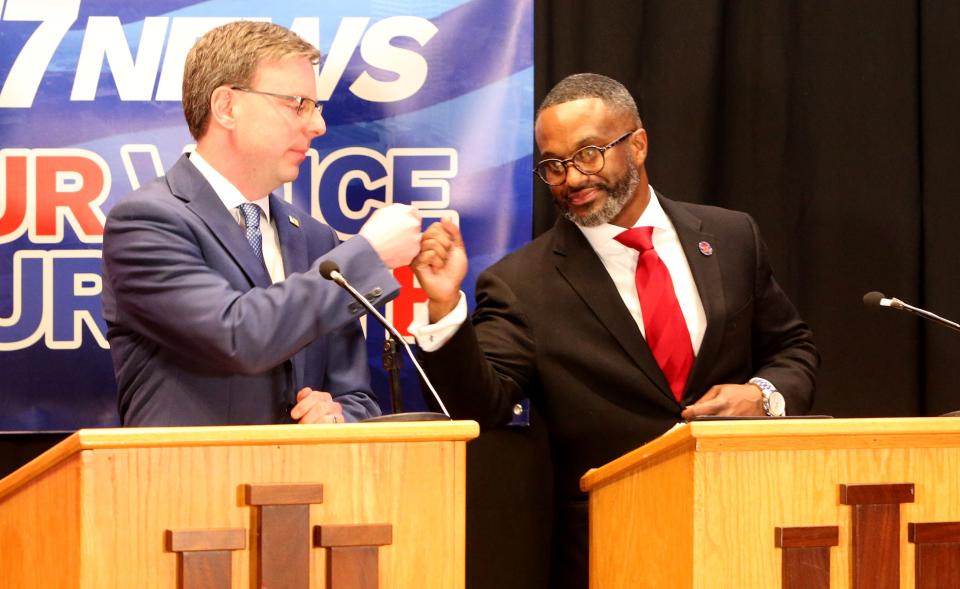
The first occasion in which the candidates went head to head underscored the different approaches they bring to governing.
Mueller, in a dispassionate tone multiple attendees said seemed overly rehearsed, insists on framing South Bend’s growth through a positive lens. He often has numbers to back it up.
Davis, however, lambasts what he calls city leaders’ lack of urgency to address issues of poverty and crime in struggling neighborhoods. He says belying the positive statistics is a negative perception about safety shared by many city residents.
Davis also shared a bit of speculative criticism made by activists who are critical of Mueller: “He didn’t want to be mayor. … He does not protrude an image that says that he wants to be mayor.”
Mueller didn’t address that comment. Instead, he repeated how the population had grown and crime had fallen.
Email South Bend Tribune reporter Jordan Smith at JTsmith@gannett.com. Follow him on Twitter: @jordantsmith09
This article originally appeared on South Bend Tribune: South Bend mayoral candidates debate ahead of May 2 primary

